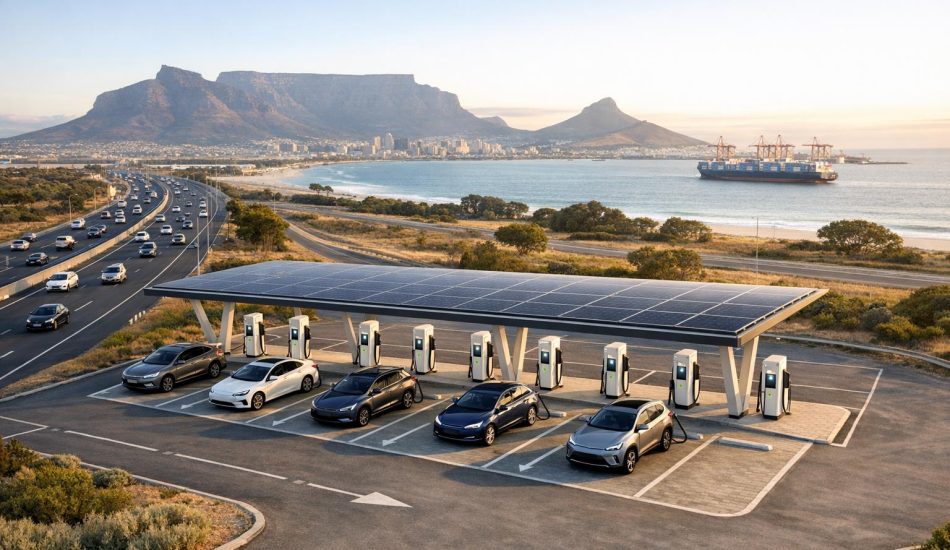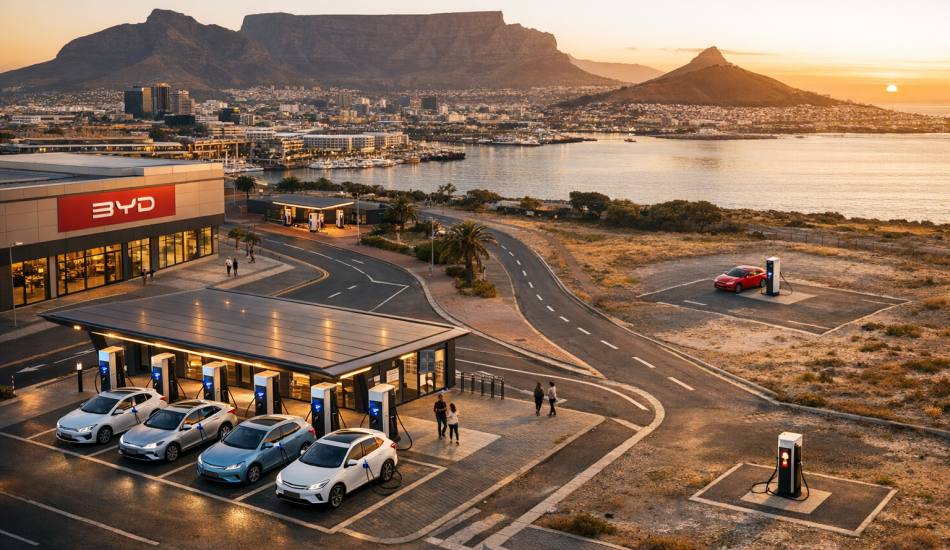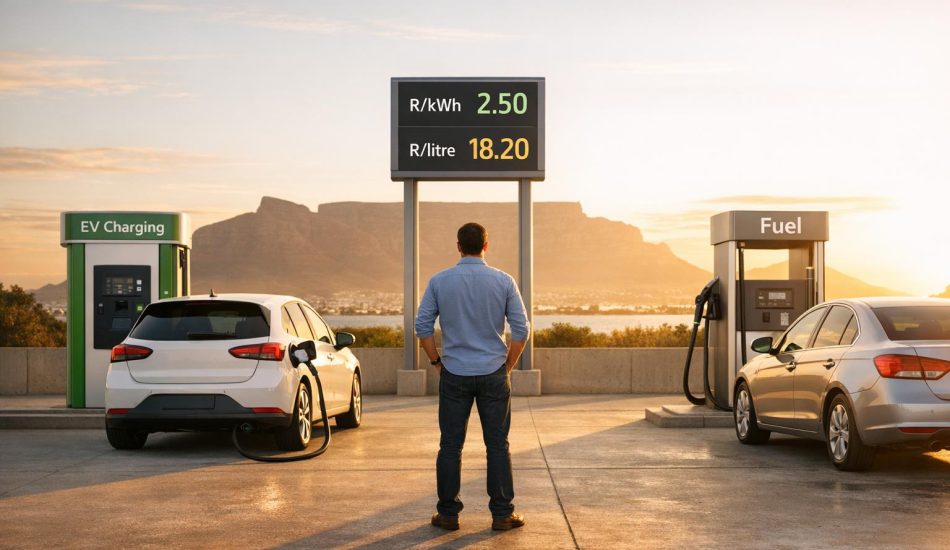
Cabo Verde is proving that small nations can lead the way in electric mobility. By 2025, 8.2% of privately owned light-duty vehicles and 8% of state vehicle purchases are electric, surpassing earlier targets. The government’s focus on renewable energy integration and EV adoption in public administration by 2030 sets the tone for its ambitious goals. Programs like ProMEC and the Electric Mobility Facility (EMF) are key drivers, facilitating the deployment of 600 EVs and 95 charging stations.
The archipelago’s compact geography makes EVs ideal for short trips, while its renewable energy capacity reduces reliance on imported fuels. Challenges like high import costs, limited technical expertise, and grid readiness exist but are being addressed through incentives, international partnerships, and infrastructure development. Cabo Verde’s progress offers a practical model for other island nations aiming to transition to cleaner transportation systems.
A small town is going all in on electric vehicles – and saving tons of green
Government Policies and Incentives Supporting EV Growth
Cabo Verde’s government has implemented a strong set of policies aimed at boosting electric vehicle (EV) adoption. These initiatives blend financial incentives with infrastructure investments, setting the stage for integrating renewable energy and expanding EV charging networks.
One standout policy is the government’s directive that, by 2025, 10% of new vehicles purchased for public administration must be electric. This approach not only establishes a reliable market for EVs but also sets an example by prioritizing cleaner transportation options in the public sector.
Tax Breaks and Financial Incentives
To ease the financial burden of EV ownership, Cabo Verde has introduced targeted measures through the Electric Mobility Facility (EMF). The EMF offers significant rebates to offset the higher upfront costs of electric vehicles compared to traditional ones, making the transition more appealing for early adopters.
"The EMF will provide a rebate covering a significant share of the incremental cost of electric cars and buses to first-mover individuals, companies and institutions." – Mitigation Action Facility
Additionally, streamlined import and registration processes help reduce both the time and costs associated with acquiring EVs. The EMF combines $5.4 million in public funding with $12.3 million from private investments, amplifying its impact through collaboration with the private sector. Alongside the EMF, the ProMEC initiative plays a critical role in accelerating the shift to electric mobility.
ProMEC and Electric Mobility Facility (EMF) Programs

The Promotion of Electric Mobility in Cabo Verde (ProMEC) project is a cornerstone of the country’s EV strategy. Running from 2020 to 2025, this $7.1 million initiative is managed by Deutsche Gesellschaft für Internationale Zusammenarbeit (GIZ) in collaboration with the Ministry of Industry, Commerce and Energy (MICE). ProMEC focuses on creating a comprehensive ecosystem to support electric mobility.
The program aims to introduce 600 electric vehicles while strengthening the legal, technical, and workforce infrastructure needed for long-term success. It also supports the installation of 40 commercial and 55 private EV charging stations and oversees five e-bus demonstration projects.
"The project will support and provide incentives for the acquisition of 600 electric vehicles, the installation of network of 40 commercial and 55 private EV charging stations and the implementation of five e-bus demonstration projects." – Mitigation Action Facility
By addressing various barriers to EV adoption, ProMEC not only encourages early adoption through financial incentives but also builds trust among consumers and attracts private sector investment. The project is projected to directly prevent 19,890 tons of CO₂ emissions, with lifetime reductions potentially reaching 401,000 tons of CO₂. These efforts align with Cabo Verde’s broader climate goals.
Together, these initiatives position Cabo Verde as a leader among small island developing states, demonstrating how electric mobility can support clean energy objectives while reducing dependence on imported fossil fuels.
Renewable Energy Integration and Charging Infrastructure
Cabo Verde is making strides in renewable energy to support its vision for sustainable transportation.
Transition to 100% Renewable Energy
Among small island developing states, Cabo Verde stands out with its bold renewable energy goals. The government has committed to increasing renewable energy’s share in its energy mix from the current 20% to a full 100% by 2040. This ambitious target is directly tied to the country’s plans for a robust EV charging infrastructure.
"Cabo Verde’s government has identified the promotion of electric vehicles as a strategy for reducing road transport-related greenhouse gas emissions as well as increasing the share of renewable energy in the energy mix, from 20 percent at present to 100 percent by 2040." – Mitigation Action Facility
By aligning clean energy expansion with EV adoption, Cabo Verde is laying a strong foundation for a greener future.
Expanding EV Charging Networks
ProMEC is actively working to grow Cabo Verde’s EV charging infrastructure. This effort is a key part of the country’s broader strategy to integrate renewable energy with sustainable mobility solutions.
sbb-itb-99e19e3
EV Market Trends and Real-World Adoption in Cabo Verde
Cabo Verde’s electric vehicle (EV) market is picking up speed, driven by focused government programs and practical projects that highlight how electric mobility can thrive on small islands.
Market Growth Numbers and EV Battery Trends
The Promotion of Electric Mobility in Cabo Verde (ProMEC) project, running from 2020 to 2025, stands as the most ambitious EV initiative in the nation’s history. Spearheaded by Deutsche Gesellschaft für Internationale Zusammenarbeit (GIZ) GmbH in collaboration with the Ministry of Industry, Commerce and Energy (MICE) and the Center for Renewable Energy and Industrial Maintenance (CERMI), the project demonstrates Cabo Verde’s dedication to transforming its transportation sector. While only 8.2% of privately owned light-duty vehicles in the country are electric, the initiative aims for 4.3% of all newly registered light-duty vehicles to be electric by the end of 2025. For a small island nation, these numbers represent a meaningful step forward.
"Given the small size of the national market, this is expected to have a strong demonstration effect and spur interest in electric mobility uptake." – Mitigation Action Facility
ProMEC is projected to reduce emissions by 19,890 tCO₂ during its five-year span and by 401,000 tCO₂ over the lifetime of the EV technology. These figures highlight the impact of earlier policy efforts and investments in infrastructure, paving the way for selecting EV models tailored to the unique needs of island life.
Best EV Models for Island Use
Catering to Cabo Verde’s specific transportation needs requires careful selection of EV models. Island driving conditions differ from those in larger regions, with most trips involving short distances and minimal highway use. This makes EVs a perfect match for the local lifestyle. For reference, the average American drives about 37 miles daily, and island residents typically drive even less. EVs with ranges between 200 to 300 miles are more than sufficient for daily use in Cabo Verde.
Thanks to subsidies, a wide variety of EV models are becoming more accessible. Compact and mid-size EVs, in particular, are well-suited to the island’s needs. Chinese manufacturers are gaining traction in the West African EV market with affordable options, while premium brands like Tesla are also generating interest. However, Tesla‘s higher price tags may limit their appeal to government fleets and early adopters.
Electric Bus Test Projects and Results
Electrifying public transportation is a cornerstone of Cabo Verde’s EV strategy. As part of ProMEC, five electric bus pilot projects are underway to test their performance on island routes. These trials allow Cabo Verde to assess different bus models and charging systems before committing to larger-scale purchases. Electric buses are especially practical for island routes, where predictable mileage simplifies range management and operational planning.
These pilot projects are doing more than just providing reliable transportation – they’re building public trust in electric technology and demonstrating the feasibility of electric commercial vehicles. They also reinforce the government’s dedication to sustainable transit solutions.
"With these combined measures, Cabo Verde will evolve to be a model for electric mobility transformation in West Africa and across the wider small island developing state (SIDS) context." – Mitigation Action Facility
Challenges and Opportunities for EV Adoption in Cabo Verde
Cabo Verde is making strides toward embracing electric vehicles (EVs), but as a small island developing state, it faces a mix of unique hurdles and exciting opportunities that could lead to innovative solutions.
Main Challenges for Small Island EV Markets
Import Costs and Logistics
Shipping EVs to Cabo Verde comes with high costs, and the small market size prevents the benefits of bulk purchasing. These factors make EVs more expensive compared to larger markets.
Technical Expertise and Maintenance
Maintaining and repairing EVs requires specialized skills, but Cabo Verde currently has a limited number of trained technicians and struggles with a lack of spare parts. This can lead to delays in repairs and cautious adoption by consumers.
Infrastructure and Grid Challenges
Expanding a charging network across multiple islands is no small task. On top of that, the electrical grid needs to be ready for the extra load from EV charging, especially during peak hours. Without planning and upgrades, bottlenecks could arise.
Battery Performance in Tropical Conditions
The tropical climate, with its heat and humidity, can affect battery performance. While newer battery technologies are addressing these issues, they remain a concern for long-term reliability.
| Challenge | Impact | Potential Solutions |
|---|---|---|
| High import costs | EVs become more expensive | Government subsidies and tax incentives |
| Limited technical expertise | Slower repairs and hesitant adoption | Technician training and skill development |
| Grid capacity constraints | Charging bottlenecks | Renewable energy and smart charging systems |
| Parts availability | Delays in repairs | Creation of regional service centers |
While these obstacles are significant, they also present opportunities for creative solutions tailored to Cabo Verde’s unique context.
Opportunities for Growth and Partnerships
Despite the challenges, Cabo Verde has several promising opportunities to accelerate EV adoption:
Partnering with International Organizations
Collaborations with global partners can bring much-needed funding, technical expertise, and knowledge sharing. These partnerships can help Cabo Verde establish a solid EV ecosystem and address some of the current barriers.
Becoming a Regional Leader
Cabo Verde’s commitment to EV adoption positions it as a potential leader in electric mobility within the region. This leadership could attract investment and partnerships with manufacturers and technology firms eager to tap into emerging markets.
Tapping into Tourism
The thriving tourism industry offers a chance to integrate EVs into rental fleets, shuttles, and guided tours. This not only supports sustainable transportation but also appeals to eco-conscious travelers looking for greener travel options.
Combining EVs with Renewable Energy
Cabo Verde’s push for renewable energy aligns perfectly with EV adoption. Using renewable energy to power EVs can reduce reliance on imported fossil fuels and create a more sustainable energy ecosystem.
Education and Financing Innovations
Investing in EV-related education at technical schools and universities can build a skilled workforce to support the market. Meanwhile, creative financing options, like leasing programs or group purchasing, can make EVs more affordable for consumers and businesses.
Expanding Electric Public Transit
Pilot projects with electric buses have shown encouraging results. Scaling up these efforts could lead to partnerships between manufacturers, charging infrastructure providers, and public or private transit operators, paving the way for a more sustainable public transportation system.
These strategies not only address current challenges but also set the stage for Cabo Verde to build a resilient and sustainable future in electric mobility.
Conclusion: Cabo Verde’s Path to Electric Mobility
Cabo Verde has surpassed its initial goals for electric vehicles (EVs), positioning itself as a standout leader in sustainable transportation among small island developing states.
The country’s progress is deeply tied to its commitment to renewable energy. With an ambitious target of achieving 100% renewable energy by 2040, Cabo Verde is setting the stage for a clean and efficient EV charging network. This focus on renewable energy not only supports the EV market but also delivers meaningful environmental benefits.
Government initiatives have played a key role in this transformation. A prime example is the pledge to transition the entire public administration fleet to 100% electric vehicles by 2030, which underscores the nation’s commitment to sustainable mobility. Financial incentives and strategic partnerships have further fueled adoption, showing how well-crafted policies can drive significant change.
The private sector has also been instrumental in accelerating this momentum. Collaborative efforts have introduced initiatives like electric bus pilot projects in Praia and Mindelo, alongside awareness campaigns and training programs. These efforts complement government actions, creating a well-rounded approach to sustainable transportation.
Another key player in this journey is EV24.africa, a platform that simplifies the process of importing and purchasing electric vehicles. With a presence across all 54 African markets, it ensures that African consumers, including those in Cabo Verde, have access to the latest EV technology at competitive prices.
Cabo Verde’s progress offers a roadmap for other small island developing states. By continuing to expand charging infrastructure, nurturing partnerships with private sector leaders, and investing in local expertise, the transition to electric mobility is proving to be not only feasible but also economically rewarding.
This journey highlights how a combination of smart policies, renewable energy integration, and collaborative partnerships can drive meaningful progress. Cabo Verde’s story demonstrates that even small islands can make a big impact in shaping the future of sustainable transportation.
FAQs
What challenges does Cabo Verde face in growing its electric vehicle market, and how are they being tackled?
Cabo Verde is working to overcome a few hurdles in growing its electric vehicle (EV) market. Key challenges include a lack of charging stations, especially on the smaller islands, and the steep initial cost of EVs. To tackle these issues, efforts are underway to build a dependable charging network, while government incentives like rebates and subsidies aim to make EVs more affordable for residents.
On top of that, financial tools such as leasing options are being rolled out to ease the shift to electric mobility. Programs like the Electric Mobility Facility (EMF) are also stepping in to lower costs and encourage early adopters, pushing Cabo Verde closer to its energy sustainability goals.
How does Cabo Verde’s renewable energy plan support its push for electric vehicles?
Cabo Verde is making renewable energy a cornerstone of its strategy to boost electric vehicle (EV) adoption. The government has set its sights on achieving 100% renewable energy by 2040, ensuring that EVs run on clean energy sources.
This initiative goes beyond cutting greenhouse gas emissions from road transportation. It reflects Cabo Verde’s dedication to tackling climate change head-on. By combining renewable energy with EV infrastructure, the country is setting the stage for a cleaner and more efficient transportation future.
How are international collaborations helping Cabo Verde adopt electric vehicles?
International partnerships are playing a crucial role in Cabo Verde’s shift toward electric mobility. The government has teamed up with organizations like the Deutsche Gesellschaft für Internationale Zusammenarbeit (GIZ) GmbH and secured funding from the NAMA Facility, a global initiative supporting climate-friendly projects, to promote the use of electric vehicles.
Initiatives such as the Promotion of Electric Mobility in Cabo Verde (ProMEC) are central to this effort, aligning with the government’s plans to boost EV adoption. These collaborations are tackling key challenges like building infrastructure, integrating renewable energy, and implementing supportive policies, helping Cabo Verde prepare for a future centered on sustainable transportation.




